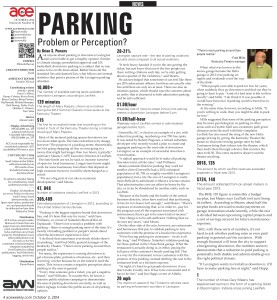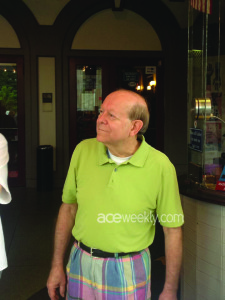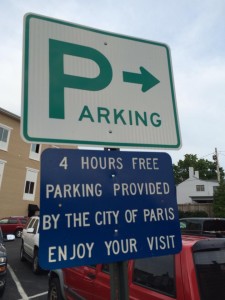Parking: Problem or Perception?

By Brian S. Powers
Ask anyone about parking in downtown Lexington and you’re liable to get a lengthy opinion. Similar to climate change, presidential approval and UK basketball, downtown parking is a subject that no one seems to be on the fence about. Rather than cite the standard lies and damned lies, what follows are instead statistics that paint a picture of the Lexington parking situation.
10,000+
The number of available parking spots available in downtown Lexington, according to LexPark
139 minutes
The length of Mary Poppins, shown as a matinee during the 2014 Summer Classics movie series at the Kentucky Theater
$15
The fine for an expired meter due to parking on the street in front of the Kentucky Theater during a matinee showing of Mary Poppins
Most of the metered parking spaces downtown are two-hour-limit spots. The time restriction is by design, however.“The purpose of a parking meter, theoretically, isn’t for going shopping all day or even going to a movie that might last longer than two hours, typically,” said Gary Means, CAPP, Executive Director of LexPark.
The time limits are set, he said, to increase turnover of spots for local businesses. Longer time limits might work for some businesses, but others that depend on high customer turnover would be shortchanged as a result.
“We see a big part of our role as economic development,” said Means.
47, 048
Number of violations cited by LexPark in fiscal year 2013
305,489
Estimated population of Lexington in 2012, according to the United States Census Bureau

“Parking is the biggest negative brand that downtown has, and it’s been that way for years,” said Gene Williams, co-owner of Natasha’s Bistro & Bar on Esplanade. “There’s not so much a problem with parking – there is enough parking most of the time. It’s mostly a branding problem in people’s minds about what the downtown experience is like.”
“I do think that sometimes everybody thinks there’s no parking,” said Fred Mills, general manager of the Kentucky Theater. “There’s more parking around than people realize.”
For many, the experience is coming downtown to get a license plate, patronize a business, etc., and then receiving a ticket because he or she failed to feed the meter. This in turn creates a negative perception about parking in the area in general.
“Every time someone gets a ticket, you get a negative brand,” said Williams. To counter this, he favors a massive public relations campaign to demonstrate the ease of parking downtown currently, as well as better signage to make the public aware of all parking options.
20-21%
Lexington capture rate – the rate of parking violations actually cited compared to all actual violations
“It feels heavy-handed if you’re the one getting the ticket, but just know that out of the five people out there writing citations each day, we’re only getting about a quarter of the violations,” said Means.
He acknowledged that sometimes it can feel like there are 200 enforcement officers, but there are usually only five and there are only six at most. There are also no citations quotas, which should ease the concerns about an entity that is chartered to both administer parking and be self-sufficient.
$1.00/hour
Weekday rate of most on-street 2-hour-limit parking meters in downtown Lexington before 5 pm
$1.00/half-hour
Weekday rate of LexPark owned or administered garages before 5 pm
Greenville, S.C. is cited as an example of a city with robust free parking, numbering over 700 free spots. It was noted by Robert Wagoner, a retired suburban developer who recently touted a plan to create and aggregate parking on the west side of downtown Lexington, as an example of successful downtown revitalization.
“A radical approach would be to make all parking downtown free all the time,” said Williams.
Means contends that free parking may work for smaller cities (Greenville had a 2012 estimated population of 60, 709, or roughly one-fifth Lexington’s population), but a city the size of Lexington is vastly more difficult to administer without a revenue stream. That administrative cost can either be borne by the city, or it can be shouldered by another entity such as LexPark.

“Because of the hustle and the bustle of the central business districts, cities have realized that just having it free for two hours isn’t enough,” said Means. “There’s expenses to maintaining that, so in order to…pay for the program and all the expenses associated with enforcement, there’s got to be some kind of income.”
“Our charge is to be self-sufficient. Nothing that we do uses any taxes,” said Means.
On the other side of the coin, however, are restaurants and businesses that pay to validate parking to lure customers with the promise of a hassle-free experience.
“We’re buying parking for customers – we do it all day long,” said Williams. Natasha’s validates parking for those parked in the Chase Bank garage. What the restaurant is actually doing is, in effect, paying the full price of the customer’s hourly parking bill. This is a way for the restaurant to lure customers with the promise of free parking, instead shifting the cost to the restaurant itself as a business expense.
“At night, it’s hard to get people downtown if you don’t make it really nice. It has to be convenient and it has to be free,” said Jim Happ, owner of Alfalfa.
20 mph
The maximum speed of the T3 electric vehicles used by parking enforcement outriders in Lexington
When what was known as the annex garage became the Helix garage in 2013, free parking on nights and weekends went the way of the dodo.
“When people were able to park for free for years, when suddenly they go downtown and find out they’re going to have to pay – kind of a bad taste is left in their mouth,” said Mills. “I do think if it was possible, it would have been nice if parking could’ve been free in the evening.”
At the same time, however, according to Mills, “If you’re willing to walk, then you might be able to park for free.”
Mills suggested that some of the parking perception may be more psychological, as parking in other areas such as Fayette Mall sees customers park great distances from the mall with little complaint.
LexPark has also eased the sting of the new Helix garage pricing by giving the Kentucky Theater the means to discount evening garage rates by half. Customers bring their tokens into the theater, which then feeds them through a device that rewrites the rates to $1.50. This extra incentive doesn’t cost the theater anything.
$918, 135
The amount by which LexPark revenues exceeded expenses in fiscal year 2013
$724, 148
The amount collected from on-street meters in fiscal year 2013
The $918, 135 figure is ostensibly a budget surplus, but Means says LexPark isn’t just lining its coffers. According to Means, about half the surplus funds are used to make payments on garage renovations made recently, while the rest is divided between upcoming capital projects and a sort of savings account for future maintenance expenses.
Still, with these sorts of numbers, it’s not hard to ask whether parking rates or even paid parking in general can’t be cut down. With enough financial will from the city to support a burgeoning downtown, the numbers seem to demonstrate that a reduction in paid parking is potentially both doable and administrable given the right political climate.
“If Lexington wants to revitalize downtown, it’ll have to make parking free at night,” said Happ.
1
The number of times Gary Means has experienced karma in the form of a parking ticket in Bloomington, Indiana since joining LexPark.
Subscribe to the Ace e-dition for Lexington news, arts, culture, and entertainment, delivered to your inbox every Thursday morning.





